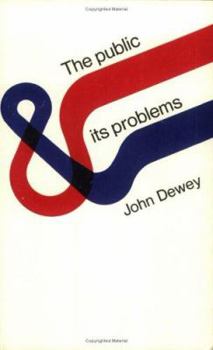The Public and Its Problems
Select Format
Select Condition 
Book Overview
More than six decades after John Dewey's death, his political philosophy is undergoing a revival. With renewed interest in pragmatism and its implications for democracy in an age of mass... This description may be from another edition of this product.
Format:Paperback
Language:English
ISBN:0804002541
ISBN13:9780804002547
Release Date:June 1954
Publisher:Swallow Press
Length:242 Pages
Weight:0.60 lbs.
Dimensions:0.6" x 5.3" x 8.3"
Customer Reviews
4 ratings
late
Published by Thriftbooks.com User , 14 years ago
This book was part of an order of three books. Two of them arrived really fast but the third one came up very late. Other than that, the book was in good condition (same as stated)
Important book in American Political Philosophy
Published by Thriftbooks.com User , 15 years ago
Dewey's work here is hard to place: it is certainly not liberal, it is not quite progressive nor is it really socialist, it is something entirely different. This is a book that might take many readings to unearth its meaning, but is entirely worth it for everyone from historians to political scientists to citizens alike. Dewey's argument focuses most closely on where to locate the public, how to create communication, and in turn, community, and how to reinvigorate democracy through true reform. This book is so enjoyable because Dewey is addressing many of the same problems we face today. His prose is thick, and it might seem slightly ambiguous and vague until the second reading (it surely did for me). Ultimately I thought it was well worth the time I put into it.
What happened to the voice of the public in politics and society?
Published by Thriftbooks.com User , 16 years ago
Dewey, in response to Lippmann (phantom public), gives a diagnosis of what is wrong with today's fading public participation and incentive to act in politics. I do not rate this book five stars only because he gives a vague description of exactly how these conditions to upturn public voice can be met. Overall it is an excellent book for those interested in modern public issues.
A Most Important Book
Published by Thriftbooks.com User , 21 years ago
Derived from a series of lectures Dewey gave in 1927, The Public and Its Problems touches on virtually all the major political philosophy questions of our day. One marvels at its continued relevance into the 21st Century. Dewey, arguably the United States' greatest thinker, does an amazing job in sifting through the problems contemporary society faces when forming a polity. The point Public and Its Problems brings up on more than one occasion is the need for political and social policy to incorporate the scientific method of testing and retesting to generate better results. Dewey refers to this as an experimental social method and surely felt corporate capitalism had used up its testing time and that a new socio-economic system should be tried. Public and Its Problems talks about how policies and theories need to be constantly in flux and not rigidly adhered. The social sciences would then work to investigate and interpret the results of the testing process. One portion of the book gives a fascinating look at a puzzling quandary Dewey proffers: that being the contradiction of the French and American revolutions having a philosophy of individualism while being massive collective efforts. This section makes for some complicated reading but it's enthralling nonetheless because it touches on a fundamental political and philosophical question. It's in this chapter of the book where he goes on to pose one of the more audacious and profound points of political thought: the essential fallacy of the democratic creed being that it assumes free human beings can rule themselves. (He obviously does say democracy is a good thing given that it threw off a restrictive cloak.) Dewey goes on to elaborate on the point indicating that what's critically necessary is an improvement to the methods and conditions of debate and discussion. Public and Its Problems goes on to ostensibly say it's the corporate capitalist press that controls policy conduct by controlling public opinion. A most astute observation. Of course this opinion is of a public that hasn't found itself, Dewey asserts. He writes "the modern economic regime control present politics much as dynastic interests controlled those of two centuries ago. They effect thinking and desire." Here he touches on false consciousness and monopolistic control over our culture and institutions and the insidious way they thwart the public from finding itself and rallying for its concerns. Most importantly, Public and Its Problems contends that the majority populace can indeed make wise decisions regarding our present day technocratic culture; the key is that they must have access to unbiased sources without a vested interest (commercial profit) in the issue. Only with a relatively independent conduit of information can the masses make informed decisions on complex subjects. Clearly Dewey would be quite dismayed to see the state of the mass media today, being wholly owned and controlled by big corporate conglomerates. He wo





